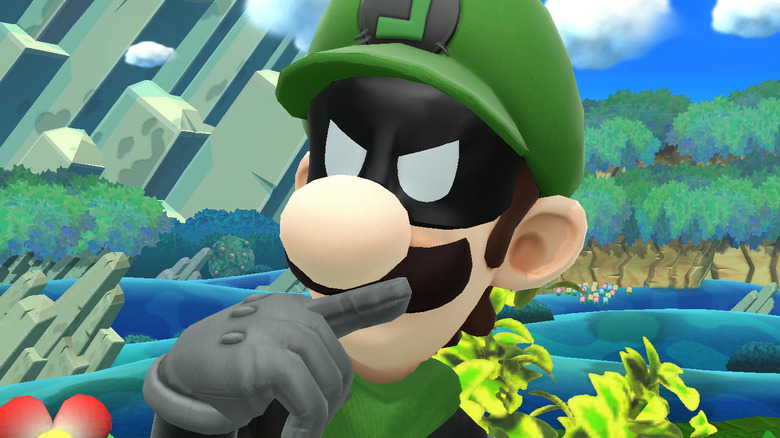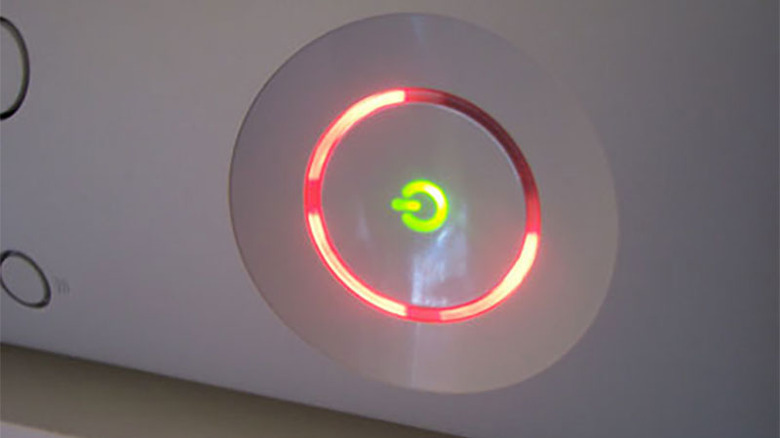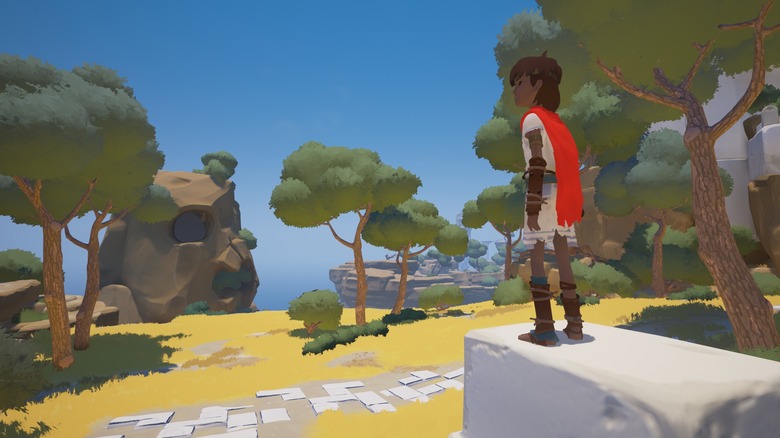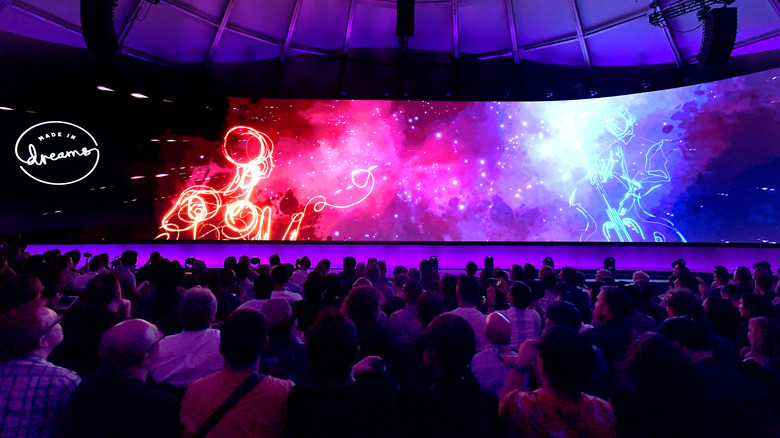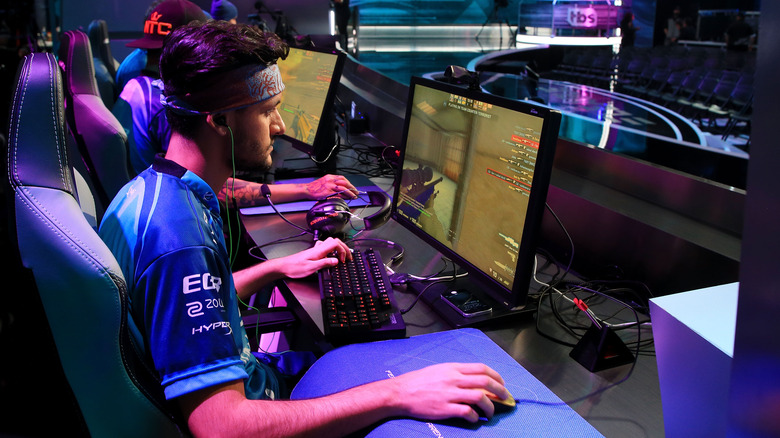Dark Secrets The Video Game Industry Tried To Hide
Video game companies have more to worry about than simply making great games: They have reputations to protect. They have annual budgets to meet and shareholders and executives to please. They have legions of die-hard fans, many of whom have high expectations and unrealistic demands the very best. It's a lot to manage. Too much, in fact. No one company can do it all.
And so, sometimes, your favorite developers, publishers, and retailers do things that are kind of scummy, and then simply do the best that they can to keep you from learning about it. That doesn't always work. No matter how much the game industry might've wanted to keep the following secrets, well, secret, reporters, government agencies, and game-makers themselves brought these fiendish schemes to light. Consider these stories a warning, and keep your eyes open in the future: you never know what the game industry will try to get away with next.
Microsoft vs the Red Ring of Death
The Xbox 360 was a great console. It was also fundamentally broken. The console didn't always work, some said. Sometimes, an Xbox 360 would up and die completely.
The issue became known as the Red Ring of Death in honor of the three red lights that'd appear around your console's power button, letting you know that your Xbox had shuffled off the mortal coil. If you had an original Xbox 360, it probably happened to you, or at least someone you know. Third-party estimates say that the Red Ring of Death hit 54.2% of all Xbox 360 owners, which was apparently caused by overheating brought on by the Xbox 360's stylish but ultimately ill-advised design.
Here's the thing, though: as reports of dying consoles began to flood the internet, Microsoft denied that anything was wrong. Early on, the house that Bill Gates built contended that the Xbox 360 failure rate was somewhere between 3% and 5% — in other words, industry standard. A year and a half later, the company refused to comment on the issue. Microsoft eventually changed its tune and instituted a warranty-extension that cost a staggering one billion dollars dollars, while 2010's Xbox 360 Slim put the Red Ring of Death to bed permanently. But the company still hasn't released official statistics on how many Xbox 360s failed. At this point, it likely never will.
The best reviews that money can buy
According to market research firm Superdata, online videos about games are a $3.8 billion industry that reaches over 468 million people annually. That's a lot of people, and some game companies will do anything to get their attention — including paying for positive coverage.
Now, there's nothing wrong with sponsored content, assuming its marked as such. Not letting your audience know that you've received money to promote a product, however, isn't just unethical: according to the Federal Trade Commission, it's illegal. That's why fans got in such a tizzy when they learned that Machinima, a popular gaming media company, gave creators bonuses if they posted positive videos about the then-upcoming Xbox One. Microsoft, of course, claims that it wasn't aware of the specifics of what Machinima was doing, and promptly terminated the relationship.
Warner Bros., on the other hand, doesn't have the same excuse. In 2016, the FTC revealed that Warner Bros. had shelled out thousands of dollars to video creators, including big names like PewDiePie, to promote Middle-earth: Shadow of Mordor. Some, including PewDiePie, added a disclaimer to their videos. Many did not. That's not fair to viewers, who often take YouTubers at their word, so it's a good thing that the FTC said something. We just hope that publishers have learned their lesson.
Game development's human cost
Despite what you might've heard, making video games isn't a glamorous job. Game developers work hard to deliver functional, fun games by the pre-appointed release dates. That's not easy, and it's no wonder that talented people are leaving the industry in droves.
And yet, even in an industry as taxing as gaming, "crunch" is a special kind of hell. As games near their release dates, it's standard practice for studios to go into overdrive, forcing employees to work inordinately long hours in order to see their titles reach completion. We're talking 80-hour work weeks. Typically, developers aren't paid overtime for the extra work. Crunch can ruin people's health and decimate their personal relationships, and when it's all done, many employees are rewarded with layoffs. It sucks, it drives good people away, and it may not even help the games all that much. When you're that tired, you tend to make lots of mistakes.
All that, and we probably wouldn't even know just how bad it'd be if one developer's pissed-off wife hadn't come forward. In 2004, a LiveJournal post by "ea_spouse" shed new light on the video game industry's abusive tendencies and brought the rigors of crunch into the open. A decade and a half later, things are getting better, but there's still a long, long way to go.
When anti-piracy tech goes too far
Anti-piracy tech might be good for publishers, but it's not great for players. Sure, SimCity's always-online requirement might've made life difficult for would-be software pirates, but it also kept paying customers from playing the game when the servers started to buckle. Same goes for Half-Life 2, Diablo III, Assassin's Creed 2, and many others.
Following the SimCity debacle, Electronic Arts came out and apologized, but digital rights management technology, or DRM, is still around. It's just taken a different form. Over the past few years, big publishers have started relying more and more on Denuvo, a tool that encrypts game software and makes it very difficult to crack. Here's the problem: there's lots of evidence that Denuvo causes games to run slower than they should, especially when it's not carefully implemented. Hackers blame Rime's long load times and Sonic Mania Plus' frequent slowdowns on Denuvo, and say that cracked, DRM-free versions run a lot faster. Tekken 7's director flat-out admitted that Denuvo was hurting his game's performance.
Rime publisher Grey Box Games eventually released a Denuvo-free version of the game for players to enjoy. We don't condone stealing games, of course, but in this case we'll say it: thank goodness for the pirates.
Does that E3 demo seem too good to be true? Well ...
Every year, the Electronic Entertainment Expo hits the Los Angeles Convention Center and gets fans' hearts all a-flutter by showing off the latest, greatest gaming tech and hottest upcoming titles. It's basically a week-long flood of trailers, with a few live demos that show off what a game looks like in action to round things out.
That's the idea, anyway. In reality? A lot of those glossy, hands-on demos that you see during E3's big press events are fake. As Kotaku reports, game publishers often put together special E3-exclusive demos that show what the game should look like, not what it actually does look like. In extreme cases, "live" demos aren't live at all. People on stage simply hold controllers and pretend to play while pre-recorded video unfurls on the screen behind them.
That leads to demos that don't always reflect the finished game. BioShock: Infinite's E3 demo promises a game that's much more open-ended than the final product, and the less said about Aliens: Colonial Marines, the better. It's easy to understand why companies do this, of course. E3 is first and foremost a marketing event, and it's embarrassing when things go wrong. Still, the practice is misleading at best, and if it wasn't for Kotaku's expose, potential customers would be none the wiser.
Winners just say yes to drugs
Esports are closer to normal sports than you might think. Both require lots and lots of practice to get to the very top, participants in both undergo rigorous physical and mental training regimens, and both have their own doping scandals.
Yes, that's right: many esports athletes rely on performance-enhancing drugs to get an edge over the competition. They tend to prefer drugs like adderall that boost energy and focus.
You won't hear many esports organizations talking about PEDs, though. In fact, the entire esports doping scene was virtually unknown until 2014, when Bjoern Franzen, an esports consultant, accused companies like Riot and the Electronic Sports League of turning a blind-eye to substance abuse. Later, Franzen claimed that "someone's legal department" tried to keep him from talking about the issue. ESL didn't implement anti-doping procedures until a year later, after Kory Friesen, better known to Counter-Strike: Global Offensive fans as SEMPHIS, admitted that he and his teammates were on adderall during ESL's Katowice $250,000 tournament, and experts say that there's still a lot of work to be done.
Nintendo, say it ain't so!
Ah, good old Nintendo, home to video gaming's most iconic characters, the source of so many happy childhood memories, and chronic price-fixer. Wait, what?
Oh, that's right, you heard us: underneath Nintendo's bubbly, family-friendly public image lurks a company that'll do anything to stifle the competition, even if it means violating antitrust laws in the process. In a price-fixing scheme, companies that'd normally compete with one another team up to keep product prices artificially high, bringing in a little bit more money for everyone. In 1991, the Federal Trade Commission said that Nintendo was breaking the law by making retailers sell the original Nintendo Entertainment System for $99.95 for a fixed 19-month period. Nintendo decided to settle rather than fight the charges, and agreed to pay $25 million in rebates to affected customers as well as another $4.75 million in additional costs.
Sadly, Nintendo didn't learn its lesson, and the company was hit with price-fixing charges again in 2002. This time, authorities accused Nintendo of keeping its products, including the Nintendo 64 and the Game Boy Pocket, from crossing national borders, which prevented customers in certain EU countries from getting the best possible prices. A (roughly) $141 million fine followed, although not before Nintendo's European distribution partner tried to downplay the severity of the crime while working with EU authorities. The fine was later reduced, thanks to Nintendo's belated co-operation.
No credit where credit is due
The big video game companies won't tell you this, but the people who you think are making your games? They're not always the people actually doing the work. Big-budget video games have a lot of moving parts, and larger developers often outsource some of the work to outside studios in order to make sure that everything is finished on time.
As Polygon reports, however, major publishers work really hard to keep this practice a secret. It goes a lot further than just keeping people's names out of the credits, too. Third-party developers often have to sign gag orders as part of their contracts, keeping them from talking about the projects that they've worked on. It's a practice that's misleading for customers and even worse for the developers themselves: if you can't share what you've worked on, it's awfully hard to get more work.
But why do companies care? Developers have a few different theories. Streamline Studios' Alexander Fernandez thinks that it's an ego thing, and that developers are keen to protect their "mystique." Others say that it simplifies things for consumers. SuperGenius director Paul Culp has a more insidious read on the situation: sometimes, investors explicitly forbid developers from contracting outside studios. At others, the developer wants investors to think that it's more capable than it really is.
Nothing good can come of pre-ordering
Okay, so you're excited about that big, shiny new game coming out. Just walk into your local video game shop the day it comes out and buy it. While pre-orders made sense back in the day, when some of the hottest games on the market shipped in limited supplies, those days are long gone for all but the most niche of titles. In fact, pre-ordering tends to hurt more than it helps — unless, of course, you happen to be GameStop or the publisher.
When you fork over a few bucks to pre-order a game, you're not just giving corporations a short-term loan for no good reason. You're giving them valuable data about your purchasing habits for no extra charge. You're also committing to a purchase before you know whether or not a game is any good. If you want to see how that can backfire, just look at the sales for games like Assassin's Creed: Unity and No Man's Sky. Fans didn't care for those games (although both got much better after launch), but their first-week sales were great. That means that a lot of people pre-ordered, and a lot of people got burned.
Of course, publishers continue to do everything they can to get you locked-in early, including tacking on increasingly ridiculous pre-order bonuses and scattering exclusive add-ons among the major retailers. Don't fall for it.
It's time to close the boy's club
While women make up roughly half of the game-playing population, the industry is still very much a sausage party. As a result, it's got a very real sexual harassment problem — one that publishers and developers continue to deny.
For example, when not one but three separate outlets conducted investigations into Quantic Dream, the studio behind Heavy Rain and Detroit: Become Human, they found a "a toxic corporate culture" in which some employees put their co-workers faces on onto sexy images, and where the studio's co-head allegedly kissed female employees without their consent. Quantic Dream's executives deny all charges. In 2017, a Naughty Dog level designer accused a team lead of sexual harassment. When he reported the abuse to Sony's human resources department, the man claims that he was fired and offered $20,000 to stay quiet. Naughty Dog disputes the story, but it's not the only time that a Naughty Dog employee has been accused of harassment.
The more you dig, the worse things start to look. Many victims of sexual harassment don't come forward at all, fearing that HR departments will dismiss the claims (or, in some cases, even defend the alleged abusers), that it'll damage their careers, and that they'll invite further abuse from internet trolls. Sexual harassment is a problem that the game industry needs to address, but as long as studios keep denying the problem, it's hard to imagine things getting much better.

